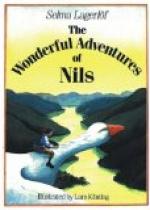With that he opened the cowshed door and went out in the yard. It was a fearful night! Neither moon nor stars shone; the wind blew a gale, and the rain came down in torrents. And the worst of all was that seven great owls sat in a row on the eaves of the cabin. It was awful just to hear them, where they sat and grumbled at the weather; but it was even worse to think what would happen to him if one of them should set eyes on him. That would be the last of him.
“Pity him who is little!” said the boy as he ventured out in the yard. And he had a right to say this, for he was blown down twice before he got to the house: once the wind swept him into a pool, which was so deep that he came near drowning. But he got there nevertheless.
He clambered up a pair of steps, scrambled over a threshold, and came into the hallway. The cabin door was closed, but down in one corner a large piece had been cut away, that the cat might go in and out. It was no difficulty whatever for the boy to see how things were in the cabin.
He had hardly cast a glance in there before he staggered back and turned his head away. An old, gray-haired woman lay stretched out on the floor within. She neither moved nor moaned; and her face shone strangely white. It was as if an invisible moon had thrown a feeble light over it.
The boy remembered that when his grandfather had died, his face had also become so strangely white-like. And he understood that the old woman who lay on the cabin floor must be dead. Death had probably come to her so suddenly that she didn’t even have time to lie down on her bed.
As he thought of being alone with the dead in the middle of the dark night, he was terribly afraid. He threw himself headlong down the steps, and rushed back to the cowshed.
When he told the cow what he had seen in the cabin, she stopped eating. “So my mistress is dead,” said she. “Then it will soon be over for me as well.” “There will always be someone to look out for you,” said the boy comfortingly. “Ah! you don’t know,” said the cow, “that I am already twice as old as a cow usually is before she is laid upon the slaughter-bench. But then I do not care to live any longer, since she, in there, can come no more to care for me.”
She said nothing more for a while, but the boy observed, no doubt, that she neither slept nor ate. It was not long before she began to speak again. “Is she lying on the bare floor?” she asked. “She is,” said the boy. “She had a habit of coming out to the cowshed,” she continued, “and talking about everything that troubled her. I understood what she said, although I could not answer her. These last few days she talked of how afraid she was lest there would be no one with her when she died. She was anxious for fear no one should close her eyes and fold her hands across her breast, after she was dead. Perhaps you’ll go in and do this?” The boy hesitated.




